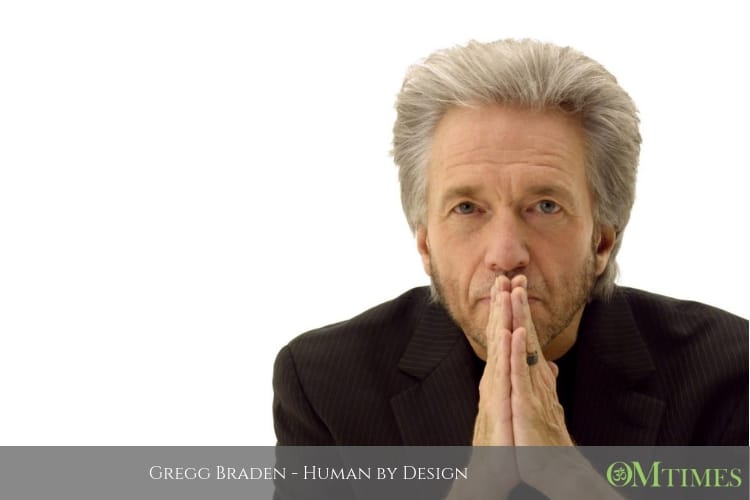Gregg Braden – Human by Design

Gregg Braden is a five-time New York Times best-selling author and is internationally renowned as a pioneer in bridging science, spirituality and human potential. Gregg focuses on solving today’s problems by weaving modern science and the wisdom preserved in remote monasteries and forgotten texts into real-world solutions. His discoveries have led to 12 award-winning books now published in over 40 languages. Gregg Braden has shared his presentations with The United Nations, Fortune 500 companies, indigenous elders, religious leaders, diplomats and the U. S. military, and he is now featured in media specials airing on major networks throughout the world.
The United Kingdom’s Watkins Journal lists Gregg Braden among the top 100 of “the world’s most spiritually influential living people” for the 5th consecutive year, and he is a 2018 nominee for the prestigious Templeton Award established to honor “outstanding individuals who have devoted their talents to expanding our vision of human purpose and ultimate reality.”
Gregg Braden’s latest work is the book, Human by Design – From Evolution by Chance to Transformation by Choice.
Gregg Braden – Human by Design: From Evolution by Chance, to Transformation by Choice
Interview by Dirk Terpstra
Dirk Terpstra: Gregg Braden. I am so honestly pleased to be with you and to share some space with you. I really appreciate you for being with me here.
Gregg Braden: I’m absolutely thrilled to be with you, and I very much appreciate you working around our crazy schedules so we can spend a few minutes together.
Dirk Terpstra: The last time that we spoke was about resilience from the heart, but this time it’s about your latest book Human by Design with the subtitle, From Evolution by Chance to Transformation by Choice. At what point in life you did start sensing that we must embrace a new story to create a more healthy and balanced future, to start changing our human story?
Gregg Braden: Well, when we look at the question of who I am, as an individual, we gather that every human who has ever walked the earth consciously or subconsciously has asked this question, and when we begin to think about the implications of the answer; and that it’s more than just a philosophical question.
Because we live our lives, we solve our problems, we heal our bodies, we create our relationships, all based on the way we answer the question, “Who am I as an individual? Who are we collectively?” So, suddenly, it evolves from a philosophical question to the very heart of every moment of every day.
When we begin to understand that, and we look at what’s happening in and what is not working in the world, the rise of hate, for example, hate based upon the color of one’s skin, or our sexual orientation or our religious beliefs, it becomes obvious that our story needs to change.
Because the brutality that we see, the war, the brutalization of other people, domestic violence, the upswing in drug abuse with young people, the opioid problem that’s happening, all those things are only possible because of our present way of thinking. But when you carry it beyond the human condition and begin looking at our planet, it’s only possible for us to destroy this planet the way we are because we’ve been taught that the planet is not significant. We’ve been taught that we are insignificant.
Scientists are telling us now there is an island twice the size of Texas made of plastic, off the coast of California, from the discarded plastic that is being thrown into the ocean and we’re losing sea life. It’s dying faster than we can even document its existence because of this kind of experience. So, when we begin to look at all these things, what we find is the way that we’ve been taught to think is directly responsible. It is the root of the very things that are destroying our nations, they are tearing our families apart, they’re destroying communities. It’s all about an obsolete way of thinking.
I’m a degreed geologist, I am a scientist. We are steeped in the story based upon false assumptions of an obsolete science on the one hand. On the other hand, people believe that story and that story has led to the hurt, to the brutality, to the suffering, to the destruction that we’re seeing today.
So, when we look at the big picture, we’re living a time now unlike anything we’ve ever seen, where globalization is happening. We’ve never seen in 5,000 years of recorded human history, we’ve never seen this, suddenly, were the things that used to separate us, don’t. So, what’s happening is we are pushing together a global population that has been separated, not only by physical borders but by thinking. So, we’re pushing together a global population of diverse cultures, diverse religions, diverse ways of thinking about men, and women and family.
All those things, we’re pushing ourselves together into a global family on the one hand and we’re asking ourselves to think about that merger through the thinking that we now know is no longer true based on separation.The good news is that the science is giving us everything we need to do that. The flip side of that is there’s a reluctance, and in many cases, there’s a resistance to sharing the science in the mainstream. So, some of the things we’re going to talk about in this interview, they’re simply not showing up, and you won’t see it in the mainstream classrooms, mainstream textbooks, mainstream television documentaries. You won’t see it, and it’s the very information that helps us to heal the divide and the separations that have caused so much hurt.
So, if we are honest with ourselves, if we truly want to bring about the kind of change that we know is possible, we’ve got to begin with the thinking, and that’s why I think this information is so important.
Dirk Terpstra: Is it fair to say then that suffering of the world is what helps you to move into action?
Gregg Braden: I spent a lot of time in Tibet with the Tibetan Buddhists. The topic of suffering is a big part of their teaching, and I’ve learned to think differently about that. What I recognize is the suffering, it’s not necessary. From the Buddhist perspective, growth comes from the suffering, but I believe personally, that that’s true. I also believe it’s not necessary to suffer from growing.
I think we can have the growth without the suffering and it’s more than the suffering. It’s about the cruelty. It’s about the atrocities based upon hate, which ultimately, stem from fear. So, this is the key for me. The better we know ourselves, the less we fear change in the world because we are self-referencing beings, is the term that’s used in science. So we become aware of ourselves. We become comfortable in a particular setting or a way of being or thinking.
And then when the world changes, we ask ourselves what does that change mean to me? How’s it going to change my life? How am I going to respond? If we don’t know who we are, then we cannot answer that question, and the change becomes scary. So the better we know ourselves, the less we fear change in the world. The better we know ourselves, the less we fear other people. So, as we are globalizing, we need to understand who we are.
So as we embrace our own power, then the differences of other people become less frightening, sexual orientation, and the different religions, and the different ways of believing about our origin and our creation, as we know who we are then, it’s less threatening to us when other people think differently. It’s when we don’t know who we are and we cling to this idea, and someone else says, “Well, I have another idea,” that becomes frightening if we don’t know we are.
So the rock-solid science is telling us that the story we’ve been taught is not true. The story of evolution, I’ll begin with that. I’m a geologist. I’ve seen evolution in the fossil record for some forms of life, some plant, some animals. I believe in evolution, it is a fact for those forms of life. The theory breaks down when it comes to humans. The science does not support the theory when it comes to humans. Number one, the physical evidence has never been there, and we’ve known that since the theory was introduced in 1959, and that has been an ongoing point of tension.
Continue to Page 2 of the Interview with Gregg Braden
Dirk Terpstra is an intuitive speaker, coach and certified HeartMath trainer. Dirk carries out a simple message: You can only be at peace, feel fulfilled and be valuable to others, when you are honest with yourself and start closing the gap between who you appear to be and who you really are. You will then discover that you are beautiful and that all the answers already lie inside of you.





